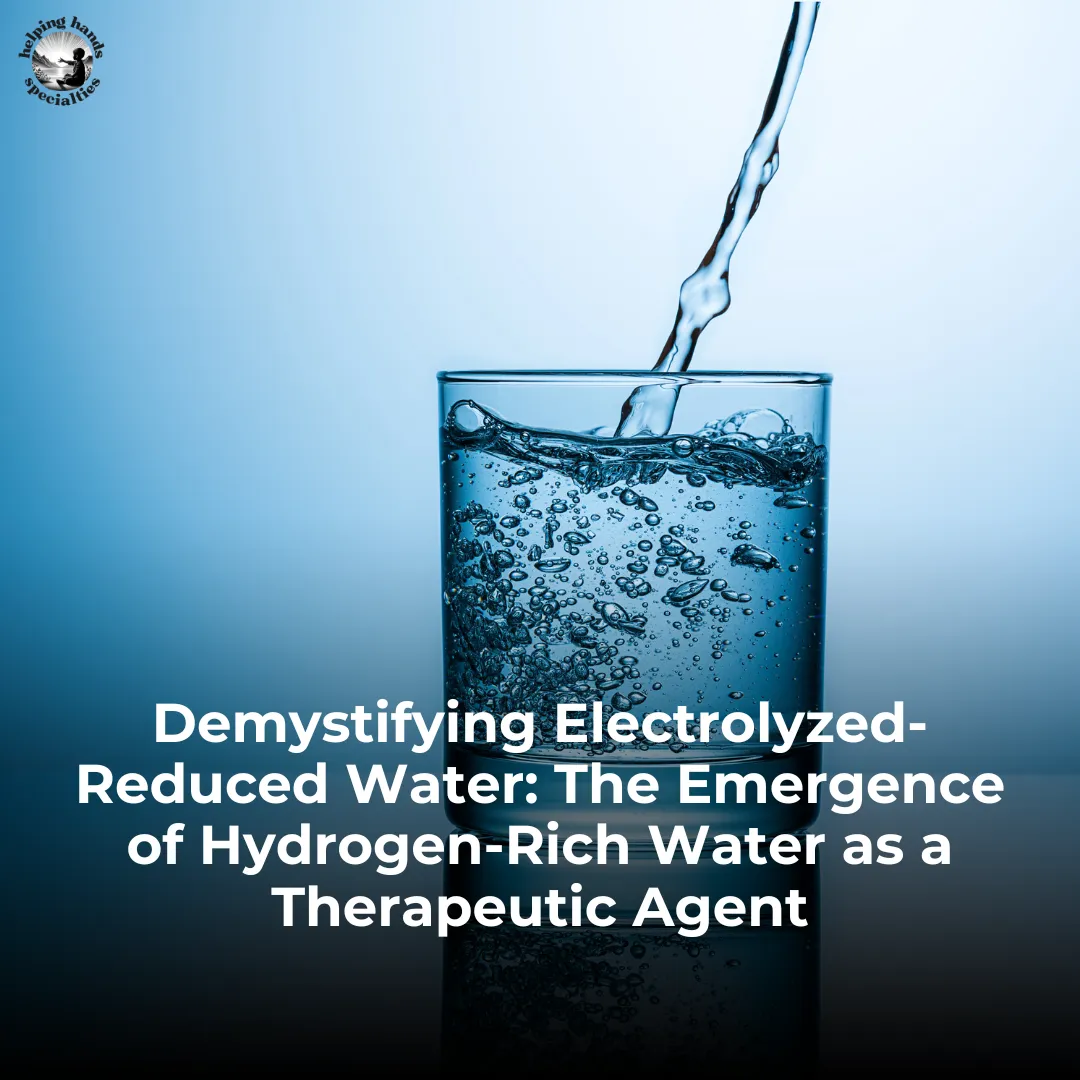Browse the Latest from Helping Hands Specialties Blog


Demystifying Electrolyzed-Reduced Water: The Emergence of Hydrogen-Rich Water as a Therapeutic Agent
Intro
In the realm of wellness and health, the allure of novel remedies often takes precedence over scientific scrutiny, leading enthusiasts down paths lined with both promise and misinformation. Such has been the journey of Electrolyzed-Reduced Water (ERW), lauded for its supposed unparalleled health benefits, attributed to its alkaline pH, unique microclustering of water molecules, and negative oxidation-reduction potential (ORP). Yet, as we delve deeper, guided by empirical evidence and rigorous scientific methodology, a new protagonist in the narrative of ERW emerges: molecular hydrogen (H2).

Unraveling the Myths Surrounding ERW
For years, ERW has been the subject of a multitude of health claims, marketed as a panacea capable of combating everything from chronic diseases to aging, predicated on properties that, at face value, appeared to challenge the understanding of water itself. Proponents posited that ERW’s altered physical structure and enhanced chemical properties could neutralize body acidity, offer superior hydration, and serve as an inexhaustible source of antioxidants. However, these sweeping claims have often found themselves at odds with the scientific community, which calls for validation grounded in empirical evidence rather than anecdotal testimonies or marketing hyperbole.

The Scientific Verdict: Molecular Hydrogen Takes Center Stage
A thorough examination of ERW through the lens of scientific inquiry reveals that the therapeutic effects attributed to ERW can, in fact, be distilled to one key element: molecular hydrogen. This discovery is nothing short of revelatory, as it shifts the focus from the pseudoscientific claims of altered water structure and magical microclusters to the tangible and quantifiable presence of H2. Unlike the other alleged properties of ERW, the therapeutic potential of H2 is supported by a wealth of scientific research demonstrating its ability to act as a selective antioxidant, mitigating oxidative stress by neutralizing harmful reactive oxygen species (ROS).
The role of molecular hydrogen in modulating biological processes extends beyond its antioxidant capabilities. H2 has shown promise in exerting anti-inflammatory effects, suppressing the production of pro-inflammatory cytokines, and potentially mitigating the onset and progression of inflammation-related diseases. Moreover, the impact of H2 on gene expression, influencing functions from cellular defense to metabolism, unveils a realm of therapeutic possibilities yet to be fully explored.

Addressing Pseudoscientific Claims and Embracing Scientific Rigor
In addressing the myths surrounding ERW, it is imperative to debunk the unfounded claims that have clouded the discourse. Scientific investigations have revealed no evidence to support the idea that ERW possesses an altered structural state known as microclustering or that its alkaline pH directly translates to tangible health benefits. These findings emphasize the necessity of grounding the discussion about ERW in reliable, evidence-based science rather than conjecture.
As the health and wellness community looks forward, the path is clear: the therapeutic effects of ERW should be attributed to and investigated with a focus on molecular hydrogen. Accurate quantification of H2 concentration in ERW emerges as a pivotal aspect of validating its therapeutic efficacy. With tools ranging from advanced hydrogen meters to innovative test strips, ensuring the precise measurement of H2 levels aligns the potential health benefits of ERW with clinical and scientific standards.

The Bright Future of Hydrogen Therapy
The reorientation of the narrative surrounding ERW towards an evidence-based understanding of molecular hydrogen heralds a new era in therapeutic interventions. The science of hydrogen therapy stands on the brink of transformative potential, ripe for exploration, and grounded in empirical evidence. This journey—paved with rigorous research, ethical marketing, and informed public discourse—invites a collaborative exploration of the myriad ways in which molecular hydrogen can be harnessed to promote human health and well-being.
Conclusion
As we stand on the brink of potentially revolutionary diabetes treatment, hydrogen inhalation therapy emerges as a beacon of innovation. The findings from the recent multicenter study underscore its significant benefits in managing type 2 diabetes, marking a significant step forward in our collective fight against this chronic condition. With its promising therapeutic effects and high safety profile, hydrogen inhalation therapy beckons a future where diabetes management is not just about controlling symptoms but also about restoring health and hope. For those navigating the complexities of diabetes, this novel therapy could indeed be the dawn of a new era.
Take Action to a Healthier Life!
As we continue to learn more and more about the positive science behind hydrogen. We want to make sure we provide our readers with the best products possible. Click the link below If you would like to start your journey with the amazing health benefits of hydrogen!
- Hydrogen Water Inhalation 4 in 1 Device
https://healthyhydration.com/products/the-best-hydrogen-water-inhalation-device?ref=T6Z70EM_uvFRiG
- Hydra Shot 4 in 1 Starter Pack (Pre-Order Special)
https://healthyhydration.com/products/pre-order-bundle-pack-3-in-one-combo?ref=T6Z70EM_uvFRiG
References:
https://www.frontiersin.org/journals/endocrinology/articles/10.3389/fendo.2022.1114221/full
https://pubmed.ncbi.nlm.nih.gov/36743938/
https://www.frontiersin.org/journals/endocrinology/articles/10.3389/fendo.2022.1114221/full
Get In Touch

